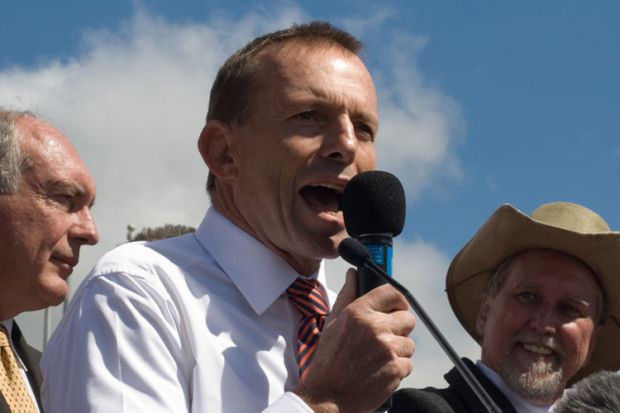It is for those closer to Australian politics than me to judge the extent to which Tony Abbott’s demise as the country’s prime minister can be attributed to his handling of higher education.
But it seems clear that it was at least one factor that brought about today’s successful challenge to his leadership by Liberal Party rival Malcolm Turnbull. And the fate of education minister Christopher Pyne in the inevitable reshuffle tomorrow could give a clue as to how badly Turnbull himself thinks higher education reform has been mishandled.
It is certainly hard to avoid the conclusion that it was mishandled. Indeed, if the definition of madness really is – as Einstein supposedly said – to keep doing the same thing over and over and expect a different result, you might even say there was a hint of insanity in the Abbott government’s repeated attempts to ram through a bill to uncap university fees in the face of implacable opposition from both the public and the crossbenchers who hold the balance of power in the country’s upper house, the Senate.
Soon after Abbott’s Liberal-National Coalition won the 2013 election, Pyne commissioned a review of higher education funding that recommended making both sub-degree courses and degree courses at alternative providers eligible for income contingent loans. The measure was, in part, intended to address the high dropout rates among the non-traditional students tempted into degree programmes by the uncapping of undergraduate numbers by the previous Labor government.
But in the budget that followed in May 2014, the Australian government tied this popular reform to university cuts of about 20 per cent, to be paid for by the uncapping of tuition fees. Although initially welcomed by virtually all vice-chancellors, the latter measure was deeply unpopular among the public, and widespread concerns emerged about the potential for the cost of degrees at top institutions to skyrocket to A$100,000 (£46,000).
Despite a A$15 million (£7.7 million) advertising campaign to promote it, and threats to cut research funding if it was not passed, the bill was defeated in the Senate in December and again in March. However, Abbott and Pyne immediately introduced the legislation for a third time, banking on using politicians’ long winter break to win over the crossbenchers. However, a third defeat has looked inevitable for months.
What Turnbull’s victory means to the reforms remains unclear, but if he does blame them for the coalition’s current unpopularity, logic would suggest that they are likely to be at least parked, if not driven into a ditch. But while that might please Australian students, it will worry vice-chancellors, who have long argued that university funding is on an unsustainable footing given the decline in per-student funding that has accompanied the removal of the cap on student numbers.
It is also tempting to speculate about the extent to which such declines are inevitable when student numbers are uncapped in an era of constrained public spending – as has just happened in the UK. Might a Conservative proposal to uncap English tuition fees be on the cards? And if it is, would opposition to that be one issue on which the Corbyn-era Labour Party could unite?
Register to continue
Why register?
- Registration is free and only takes a moment
- Once registered, you can read 3 articles a month
- Sign up for our newsletter
Subscribe
Or subscribe for unlimited access to:
- Unlimited access to news, views, insights & reviews
- Digital editions
- Digital access to THE’s university and college rankings analysis
Already registered or a current subscriber? Login





